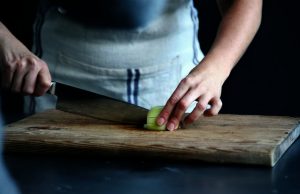Difference Between Cook And Chef: Outside the culinary business, the terms chef and cook are frequently interchanged, despite the fact that they have distinct meanings inside the field. To put it simply, a chef is someone who has been taught to comprehend tastes and culinary processes, to create dishes from scratch using fresh ingredients, and to have a high degree of responsibility in the kitchen. A cook is someone who prepares meals according to predetermined recipes.
While the definition of each position covers the essentials, there is a deeper explanation behind the variances. There are several distinctions between a chef and a cook, and we’ve taken the effort to clarify them in this post.

Recommended: Best Foods in the world 2022
Who is a cook?
Cooks are trained professionals who prepare and cook meals. They spend the most of their time transforming materials from their raw form to final dishes.
Cooks come in varieties, each with their own set of responsibilities. A prep chef, for example, assists with tasks such as slicing vegetables, pre-portioning protein pieces, and preparing sauces and dressings. Line cooks, on the other hand, are in charge of preparing, plating, and serving prepared food.
Cooks are frequently classified according to their stations. A fry chef maintains a consistent supply of hot, fresh french fries and other crispy foods by operating the fryer. Grill cooks are in charge of burgers, poultry, steaks, and various vegetables that are cooked.

Recommended: Countries with the Most Nuclear Weapons In The World 2022
Who is a chef?
A chef is a skilled, experienced culinarian who has served in a professional culinary environment and is generally in charge of a particular department or a team of cooks. Chefs have more responsibilities than cooks and must be both leaders and culinary specialists. This implies they must be adept at problem solving while under duress – the ability to appraise circumstances and devise solutions rapidly is critical.
A chef’s time is generally spent directing and managing the rest of the crew rather than actually cooking. They must be able to step into any position and mentor other team members as necessary.
They may, however, be given the opportunity to develop their own dishes and menus, so impacting the restaurant’s reputation and contributing to form its themes. As a result, while they have more responsibility than cooks, they also receive more credit when a kitchen performs well.

Recommended: Countries with the Most Beautiful Women in the world
Differences Between a Chef and a Cook
1. Specialties: Cooks are less likely to have a speciality connected to their culinary abilities. They can usually prepare the main meal, a side dish, or a dessert from a recipe. Cooks, on the other hand, may have several titles in the kitchen depending on their years of expertise.
Among them are:
a. Line cooks: Line cooks are in charge of a single cooking station, such as a griddle or a fryer. To move to this position, you’ll need four years of culinary experience.
b. Prep cooks: Prep cooks clean produce, prepare ingredients, chop vegetables, cut meat, and conduct other pre-cooking tasks in order to prepare items for the line cook. They usually have little more than a year of cooking experience.
c. Short-order cooks: Short-order cooks operate in locations like fast-food restaurants and diners, where they accept numerous orders at once and employ less complicated cooking methods like microwaving, frying, and grilling. This role normally does not require any prior experience.
Chefs, on the other hand, may be recognized for their competence in a certain sort of cuisine or preparation method, as well as their education and experience.

Recommended: Countries with the best education system in the world
These are some of the roles:
a. Executive chef: This chef is frequently the kitchen’s principal supervisor. They can usually prepare any dish on the menu or as a customer requests, and they frequently plan meals and make decisions about the establishment’s offerings.
b. Sous chef: These chefs are executive chefs’ assistants. They carry out their responsibilities and manage the kitchen personnel.
c. Pastry Chefs: Pastry chefs specialize in crafting distinctive sweets and related things such as cookies, cakes, and bread.
d. Garde manger: This sort of chef specializes in cold meals like salads and various dressings.
e. Chef de partie: Similar to a line cook, this sort of chef is in charge of a specific area of the kitchen, such as meat preparation or sauce preparation.
f. Commis chef: This sort of chef is usually a trainee or apprentice that focuses on food preparation skills including chopping, slicing, peeling, and other similar activities. Commis chefs are similar to prep cooks, but they train or learn culinary methods in order to progress up the chef hierarchy.
Recommended: Differences between an Entrepreneur and Businessman
2. Kitchen hierarchy: Cooks usually work at the bottom of the kitchen hierarchy, in entry-level roles. They may accept instructions from supervisors, but they usually just offer commands and guidance to workers who work on the service floor, such servers or bussers. Chefs, on the other hand, may be at the top, middle, or bottom of the kitchen hierarchy, based on their specific roles, expertise, and amount of responsibility.
An executive chef, for example, may be the kitchen’s boss and report exclusively to the restaurant’s management or owner.
They have the authority to give instructions to line cooks, waiters, and anybody else in the kitchen. Although a sous chef reports to the executive chef, he or she has the ability to oversee the kitchen when the latter is unavailable.
3. Responsibilities: Cooks follow recipes to create meals for others. They do things like chopping and boiling in the kitchen. They may carry out meal plans created by a supervisor and do other duties such as cleaning the kitchen and ensuring correct storage practices.
In the kitchen, chefs have more creative freedom. They are better knowledgeable about food preparation and creation.
Chefs prepare dishes without following a recipe and may alter, adapt, or experiment with ingredients as necessary. They may also decide on the menus for their eateries and consult on personnel and business strategy. Chefs may also have managerial or supervisory tasks in the kitchen.
Recommended: Best African countries to start a business
4. Work environment: Cooks frequently work in places where you wouldn’t expect to get a meal, such as schools, jails, or hospitals. Chefs, on the other hand, work at establishments where you go particularly for a meal, such as restaurants or resorts. In restaurants, cooks may operate under the direction of chefs.
5. Customer payments: Chefs are virtually always employed in establishments where consumers pay to eat their meal. They’re respected experts in their industries, and their dinners are in high demand. Cooks, on the other hand, are not always paid by customers. While they may be paid an hourly rate or a salary for their work, the individuals who consume their meals may not be paying for each meal.
A cook at a nursing home, for example, may be paid a wage, but the residents normally do not pay each meal to consume their meals. Cooks are more likely than chefs to donate their time and talents for events such as fundraisers, festivals, and other community gatherings.
Recommended: Differences between Being smart and intelligent
6. Training: Before beginning their jobs, cooks may have little or no professional training. They might be self-taught or have a passion for cooking or baking that they pursue on their own time and with their own money. From personal experience, cooks frequently know fundamental preparation skills, as well as food storage and safety best practices.
Chefs, on the other hand, have extensive practical training before being hired. They may even begin as cooks to learn the fundamentals of kitchen operations before moving on to a culinary apprenticeship. These programs include hands-on training with a professional chef to improve skills and understanding of the business.
Recommended: Differences between a Resume and a Cv
Conclusion
Chefs and cooks are both important members of a culinary team. They all have distinct duties to play in keeping a kitchen running efficiently. A chef, on the other hand, has more experience and education than the profession demands. Chefs receive greater incomes and execute various degrees of duties as a result of this important distinction.
Chefs are frequently higher in the culinary hierarchy due to their training, and their remuneration reflects this. They put in long hours to master the trade and excel at expressing themselves creatively in the kitchen. As a result of their efforts, they are able to enjoy rewards that are unique to their area.

Edeh Samuel Chukwuemeka, ACMC, is a lawyer and a certified mediator/conciliator in Nigeria. He is also a developer with knowledge in various programming languages. Samuel is determined to leverage his skills in technology, SEO, and legal practice to revolutionize the legal profession worldwide by creating web and mobile applications that simplify legal research. Sam is also passionate about educating and providing valuable information to people.